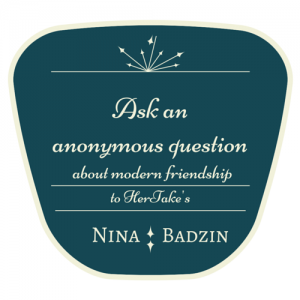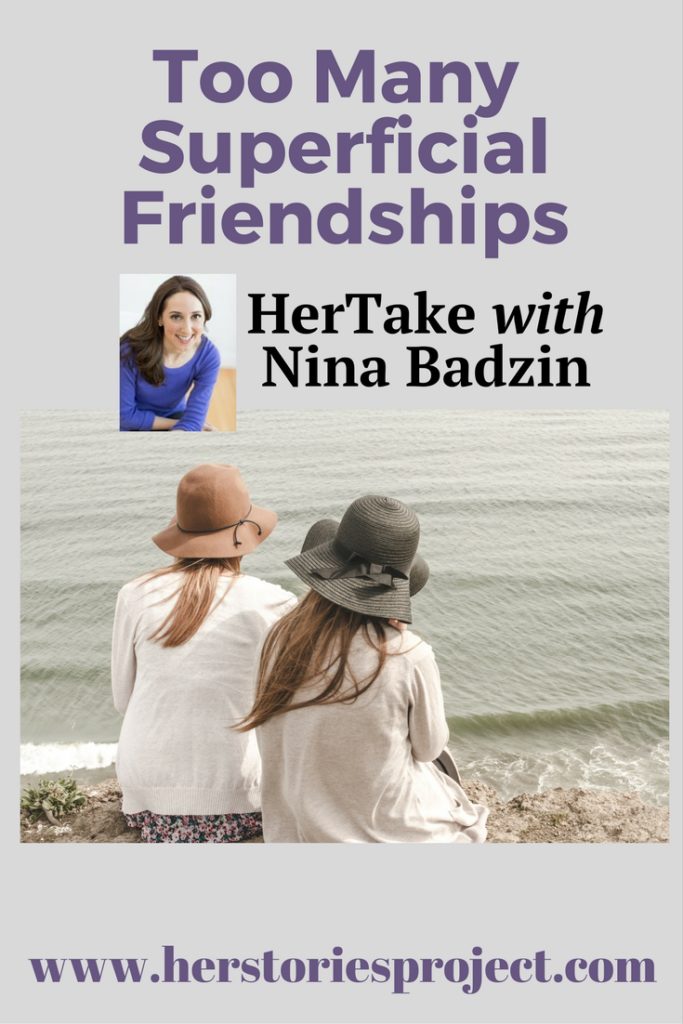When do you unfriend someone on Facebook? If you’ve done it, did you have any regrets? We’re still in new territory when it comes to friendship boundaries online and all opinions are welcome here. Let us know what you would do in the same situation.

Do you have a question for Nina? Use our anonymous form. You can read Nina’s answers to past questions here.
Dear Nina,
Five years ago my best friend of thirteen years and I had a falling out. It took me five years to get over the tragic loss of this relationship and especially the lack of civility in our parting. I sent her a sappy email several times over the years. I even left a note at her house once, but she never acknowledged receiving it. That was the turning point when I forced myself to stop trying. I realized that she didn’t care, which helped me move on even though I missed the friendship.
Then out of nowhere, she called. She left me a voicemail and all at once I felt validated. “She does care,” I thought. “She doesn’t hate me. She misses me!”
Quickly though, I felt fear. After all, I had just gotten to a point where I really didn’t care if we ever talked again and it felt freeing and healthy. That said, I didn’t want to give up the opportunity to have a conversation that could lead to some closure. If calling her back meant that I would have resolution and that maybe we could be the kind of friends who send a Christmas card or just say “Hi,” every few years or so, then that would feel like a better way to honor the good years we had together. I didn’t want things to be so black and white.
I got up the nerve to call her back. I was so nervous, but I threw caution to the wind and left my shaky, awkward voicemail and then waited. She didn’t call me back. I felt as raw as when it had first happened five years earlier. How could she come back into my life and then disappear again?
Three months later I was coming off a huge project, I was on my way out of the country for a big trip, and I was on a great high from life. She texted me: “I think about you a lot and I hope that you and your family are doing great.” I almost texted right back in all my happy elation from the events and the text.
But then I stopped myself. How would I feel if she didn’t text back? I was back in economics 101, opportunity cost, weighing and measuring my reward to investment in a human relationship. So I didn’t text. I decided to see how I felt after my trip.
When I got back in town, I saw that she sent me a friend request on Facebook. I thought, “This is it! She’s serious about being in communication.” However, something didn’t feel right about a person who wasn’t there for me having full access to the history of my past five years and day-to-day life. On the other hand, I didn’t want to make a decision out of fear so I accepted the request and I wrote her back.
It was more of the same, “I hope you’re well.” I asked how she was and tried to start more of a conversation and her answers were one-word responses. I asked her more and she didn’t respond at all.
Communication to me is not a one liner. I am really happy to know that she thinks about me and that the freeze has melted, but her not returning my voicemail really hurt as did the way our friendship ended five years ago.
However, trying to come to a resolution with her sounds daunting, and I can see that she will never want to talk about what happened five years ago. I feel uncomfortable with her as a Facebook friend, but I fear that if I unfriend her, I will be sending a juvenile, “I’m still mad at you” message.
What do you think I should do?
Thanks,
Hovering Over the Unfriend Option
Dear Hovering Over the Unfriend Option,
Before we delve into your Facebook options, it’s worth mentioning that while your hurt feelings about the end of a thirteen-year friendship are completely understandable, you might have a false sense of how at peace you’d be if you only knew why your friend severed ties.
Having been dumped by a friend many years ago in much the same way you described, I know that it takes years to get over the loss. One of the main issues to contend with is the lack of control you had over the fate of the friendship as well as a total absence of closure.
I remember pouring my heart out to my former friend years later when we reconnected for a short time (in pre-Facebook years) and she generally said, “Oh that? I can’t remember.” It was wholly unsatisfying and her nonchalant attitude created a new sense of confusion over the good parts of the friendship, too.
The end of a friendship is tricky no matter how the details play out. If your friend had provided a list of reasons five years ago, I doubt you would have felt better about her unilateral decision. You might have felt more hurt and rejected.
Now let’s discuss the part of your predicament that affects many relationships on Facebook.
In “real life,” we don’t let every person we know into the inner circle, so how does the same decision-making function online? Who should get to see the status updates and pictures we share?
What does Facebook mean for you?
The answer to that question depends on how you view the role of Facebook. The discussion that follows pertains to Facebook friendships in general, not just your situation with this one particular friend. I also want to be clear that there is not one right answer for how one shares and receives information on Facebook.
My local (and Facebook!) friend, Dana, said, “I try to be selective on my social network and ask myself if I ran into this person would I be really excited to see them and maybe get a coffee. If not then they shouldn’t have so much access to my life on the Internet.”
For someone like me, a blogger for almost five years and a personal essay writer with work online, I have a looser set of boundaries for my virtual connections. I organize my Facebook friends in a way that lets me share photos of my kids with my “friends” category whereas my links to online essays I’ve written or enjoyed fall in the “public” or “friends” plus “acquaintances” categories. You have to keep your Facebook connections organized for the privacy functions to work this way. More on that later.
Nina’s policy: when to unfriend someone on Facebook
As for my personal policy on unfriending: I have never unfriended anybody because there are other options that are less extreme. Yes, I think unfriending can be an extreme choice, especially in the realm of close friends and family members. (Note that the friend at the center of your letter does not fit into either of those categories.)
If I felt that family members were criticizing my posts, I’d restrict their access. I’ve never felt the need to hide anyone else’s posts, but if a friend’s updates really bothered me, I would choose the hide or unfollow route before I unfriended. The unfriend and especially the block option seems more appropriate for when someone is harassing you with obnoxious comments or in any other capacity.
More reasons for hesitation about unfriending
When you choose to unfriend on Facebook, you’re saying, “I want to cut off all online access to that person as well as cut off that person’s access to me.” Let’s say you vehemently disagree with a friend’s politics, yet you still want to push “like” on a picture of her kids once in a while to stay connected. That is still possible with the hide, unfollow, and restrict options, but once you hit “unfriend,” any relationship on Facebook is over.
And I’d argue it damages the relationship off Facebook, too. It can be surprisingly hurtful to be on the receiving end of that kind of instant “I don’t want anything to do with you” message in a situation that really called for a more gentle approach.
All that said, in the case of your non-communicating former friend, I think that “unfriend” might still be the best choice. But for readers with different Facebook issues, let’s explore the other options in more detail.
Unfollow
When you go to a friend’s Facebook page, you will see a box under “friends” that says “following,” which is the default setting. “Following” means that this person’s posts can appear in the newsfeed. (The “newsfeed” are the posts you scroll through when you’re “reading” Facebook.) A friend will not know if you’ve chosen to unfollow her. If you open the drop down menu in the “following” box, you will see an option to “unfollow.”
By clicking unfollow, you’re telling Facebook to keep this person’s posts out of your feed. You will have the option to visit this person’s page any time you want because you’re still “friends,” but you won’t be confronted with her information in the feed. You can choose to follow this friend again at any time, such as after the election season, a year after her book release, or whenever you’re ready to see her posts in the newsfeed again.
Hide
Next to each Facebook post there’s an arrow with a drop down menu. The first option in the menu is “hide post.” If you want to only see a friend’s posts occasionally, then Facebook will get the idea and stop showing you her posts so often if you hide her posts now and then. Again, nobody gets notified when you hide a post.
Restrict
The restrict option requires knowing how to make friend lists and how to choose the audience for each post. Facebook has good tutorials for both. (This one is for lists. This is one for audience selection.) People do not know when they’ve been added or removed from your lists.
Here is what Facebook says about the “restricted” list: “Putting someone on the Restricted list means that you’re still friends, but that you only share your posts with them when you choose Public as the audience, or when you tag them in the post. For example, if you’re friends with your boss and you put them on your Restricted list, then post a photo and choose Friends as the audience, you aren’t sharing that photo with your boss, or anyone else on your Restricted list. However, if you tag your boss in the photo, or chose Public as the audience, they’ll be able to see the photo.”
Sometimes unfriending is best
The restrict and unfollow combo might do the trick in this situation, and it’s certainly the easier path to take, but another wise friend of mine in town had this to say about your question. I think her view is worth considering.
“From what I’ve read, it sounds like the friend who disappeared five years ago hasn’t reconnected on Facebook at all except for making the friend request. She hasn’t replied to the Facebook message, she hasn’t commented on pictures. Does she ever push like on a post or a picture? If not, there are not really any virtual ties except for the fact they are ‘friends on Facebook.’
Maybe the friend accidentally requested her to be a friend. Maybe the friend has hidden the letter writer from her newsfeed and doesn’t ever attempt to have access to her life. It sounds like having the former friend as a ‘friend’ on Facebook is causing too much distress and better to unfriend and move on. If the letter writer just unfollows or restricts the former close friend, the temptation to revisit the past is harder to ignore.
I agree that unfriending is harsh, but in this case, unfriending seems appropriate as the letter writer initially accepted the request hoping that they could reconnect, which didn’t happen. There may be reasons that have nothing to do with the letter writer specifically, but since she’s not getting any response, it seems it’s time to end the virtual (non) relationship.”
When someone gets unfriended, she does not receive a notification, but she will see that you’re not friends if she were ever to visit your page. You will also no longer have access to her page unless she posts some updates as “public.” To my wise friend’s point, restricting your access to her information might be an important step in moving on from this past relationship.
The main problem, the bigger problem than the Facebook one, is that you are still mad at your old friend.
You have a right to feel rejected, however, you already know that your intense focus on that hurt has not helped you. The old friendship, the way it ended, and the small ways that this friend has weakly reached out then scurried back into oblivion have already required too much emotional energy. So yes, I agree that some Facebook boundaries are in order with this friend. I just can’t say definitively which route to take.
Perhaps some of the HerStories readers have a stronger opinion. Comment away, readers!
Editor’s note: The topic of unfriending on Facebook has become even more complicated because of last year’s election. We did a survey of the effects of the election on friendships. You might be surprised to learn how many of our readers have been unfriended (or have unfriended themselves) because of politics! (Here’s the post.)

You can follow Nina on Facebook and Twitter.
Keep reading






